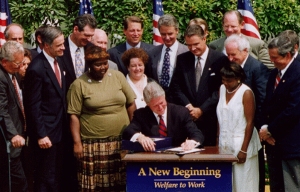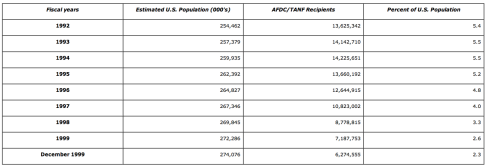Clinton and the End of Welfare
 It has been three years since President Clinton has signed the Personal Responsibility and Work Opportunity Act (PRWOA), which replaced AFDC with Temporary Assistance for Needy Families (TANF). The Republican controlled Congress pushed two welfare reform bills that President Clinton vetoed. When he finally signed PRWOA, President Clinton received a lot of criticism from many left leaning Democrats – even three members from within his administration were not pleased. Many Democrats argued that PRWOA was too harsh on the poor and would hurt those on welfare more than it benefited them. President Clinton would not sign any bill that would hurt the poor. In fact, when President Clinton was running for office in 1992, he pledged to “end welfare as we know it”. He did not want people to rely on welfare; he wanted “to make welfare a second chance, not a way of life” (Clinton). PRWOA provided block grants to states to assist the poor. About 16.5 billion dollars would be given to states each year to create their own welfare system, as long as they follow specific federal requirements.
It has been three years since President Clinton has signed the Personal Responsibility and Work Opportunity Act (PRWOA), which replaced AFDC with Temporary Assistance for Needy Families (TANF). The Republican controlled Congress pushed two welfare reform bills that President Clinton vetoed. When he finally signed PRWOA, President Clinton received a lot of criticism from many left leaning Democrats – even three members from within his administration were not pleased. Many Democrats argued that PRWOA was too harsh on the poor and would hurt those on welfare more than it benefited them. President Clinton would not sign any bill that would hurt the poor. In fact, when President Clinton was running for office in 1992, he pledged to “end welfare as we know it”. He did not want people to rely on welfare; he wanted “to make welfare a second chance, not a way of life” (Clinton). PRWOA provided block grants to states to assist the poor. About 16.5 billion dollars would be given to states each year to create their own welfare system, as long as they follow specific federal requirements.
Since PRWOA has been signed, more welfare recipients have found jobs and are now working. According to data from the Department of Health and Human Services, “the percentage of working recipients reached an all-time high in fiscal year 1999 at 33 percent, compared to less than 7 percent in 1992 and 11 percent in 1996.” PRWOA led many welfare recipients to find jobs. “UPS hired 52,000; CVS/pharmacy hired 45,000, 60% of whom remain” (Wolf).
There have also been increased measures to establish paternity at birth, and child support collections have increased 68% from 1992 to 1997 (Administration for Children and Families). The child poverty rate has declined from “22.7 percent in 1993 to 18.9 percent in 1998 – the biggest five-year drop in nearly 30 years” (Administration for Children and Families). With such promising statistics, we can see that President Clinton made the right choice in signing PRWOA into law in 1996.
President Clinton took other measures to ensure the success of welfare reform. He doubled “the earned-income tax credit in 1993 for lower-income workers; the 1997 Balanced Budget Act, which included $3 billion to move long-term welfare recipients and low-income, noncustodial fathers into jobs; the Access to Jobs initiative, which helped communities create innovative transportation services to enable former welfare recipients and other low-income workers to get to their new jobs; and the welfare-to-work tax credit, which provided tax incentives to encourage businesses to hire long-term welfare recipients” (Clinton). In 1997, he even increased the minimum wage and doubled “federal financing for child care” (Clinton).
In just three years, the president has done a great deal to end the dependence on welfare handouts by creating work incentives. This bi-partisan effort has done a great deal to change the welfare system for the better. Just from looking at some of the statistics in the past few years, PRWOA is proving to be a success.
The White House,
September, 1999
Sources:
Administration for Children and Families. “Third Annual Report to Congress – Executive Summary.” Administration for Children and Families. U.S. Department of Health and Human Services, 21 May 2010. Web. 24 Apr. 2012. <http://www.acf.hhs.gov/programs/ofa/data-reports/annual3/annual3execsum.htm>.
Clinton, Bill. “How We Ended Welfare, Together.” The New York Times. 22 Aug. 2006. Web. 24 Apr. 2012. <http://www.nytimes.com/2006/08/22/opinion/22clinton.html?_r=1>.
Wolf, Richard. “How Welfare Reform Changed America.” USA Today. Gannett, 18 July 2006. Web. 24 Apr. 2012. <http://www.usatoday.com/news/nation/2006-07-17-welfare-reform-cover_x.htm>.
photo credit: http://www.amistadresource.org/LBimages/image_09_01_030_clinton_prwora.jpg

This reform will change welfare for the better. It addresses the issue of behavior and work incentives previously absent in U.S. poverty policy. With people now realizing they must work to be economically sustainable, I believe we will see a dramatic decrease in the number of welfare recipients and in poverty levels. People must be incentivized to become productive citizens, and the TANF reforms succeed in doing just that.
Sure the number of welfare recipients with jobs has increased, but what kinds of jobs are these? Just because welfare recipients are working does not mean they’re earning a livable wage. A job at CVS Pharmacy, as you mentioned, certainly doesn’t pay enough to support an entire family. If we push the work requirement too hard we let other important things fall to the wayside. For example, what about education so that welfare recipients can gain skills and prepare themselves for more stable, well paying positions? What about the value of having mothers stay home to raise their children in order to keep them off the streets? We need to realize that this individualistic, only the strong survive kind of mentality only goes so far.
We can no longer just give handouts to the poor. As President Clinton said, we need “to make welfare a second chance, not a way of life.” An entry-level job is the first step in creating a new life, free from the reliance of government handouts. As you mentioned, a CVS job might not be a very high paying job, but it is a job and does provide income. This will provide basic job skills needed for employers to seek other higher paying jobs. I also want to reiterate that President Clinton raised the minimum wage, which would benefit hourly wageworkers. Parents with children still receive federal aid for their children. They would remain covered under TANF while parents would be encouraged to find jobs.
The problem is that these are entry level jobs with no future. It is very unlikely that working as a maid, janitor, cashier, etc. will lead to a higher paying job. And this is because these jobs aren’t helping people develop their skills in reading, writing, analysis, computer work, etc. I’m not saying this kind of employment is a bad thing, but if we force people to take these kinds of jobs we should simultaneously help them with their education so they can move up in the workforce. In addition, though President Clinton may have raised the minimum wage, his program does not require state governments to provide transportation or childcare assistance for welfare recipients, making it extremely hard for them to meet TANF’s work requirements.
Look, if a person is going to make an irresponsible decision, like having a child at a young age or during a time of economic insecurity, then it is up to the individual to figure out how to make this situation work financially. The government cannot be a parent to those who choose a more economically difficult lifestyle, nor should it. As we’ve seen in the past, government handouts only serve to diminish the value of work and perpetuate the national poverty rate. We must break this cycle. We must change behavior. Yes, people are going to have to make hard decisions, but it is these hard decisions, and the hard work required to become economically self sufficient, that create productive citizens and thereby reduce poverty in the long-term.
Although the President Clinton’s program “does not require state governments to provide transportation or childcare assistance for welfare recipients, making it extremely hard for them to meet TANF’s work requirements” as you say, PRWOA and TANF have certain federal requirements, but for the most part are left to the states. The state government can use the block grants to best suit the needs of their own constituents. If the state needs to provide more transportation for welfare recipients to get to work, then they can use the bloc grants to fund those programs. It is not the federal government’s responsibility to provide public transportation to welfare recipients – that is something that needs to be addressed at the state and local levels. Even so, President Clinton has signed legislation to help the poor get to work. The Access to Jobs initiative helps local communities create transportation services to help welfare recipients and low-income workers get to their jobs.
I do not appreciate you referring to my daughter as “an irresponsible decision.” Yes, my boyfriend and I are young parents, but we are trying our best in raising Nia. He is trying to find part time work, while I am at home taking care of my daughter. I would like to go out and find a job, but right now she is too young to be in school, let alone left alone. We get a little bit of help from my mother, but ever since she began working part time to support our family when I was still little, she has very little free time.
Yes, I understand that a lot of people view welfare as mere “handouts” to women like me, but they fail to understand that right now, I have no other choice. Once my daughter gets older, I will consider looking for a job or continuing my education, or if the opportunity is available – both.
I agree with the need for people to be free of welfare for I do not think that anyone wants to feel tied to any social program but I think that PRWOA and TANF do not acknowledge certain problems. As mentioned by our local community activist, the programs do not provide the means for jobs in growing industries. It is absolutely true that people on these programs are often limited to jobs that offer small wages and little social mobility. I would also like to add that there is a limited number of these sorts of jobs. What will happen to welfare recipients who want to work but do not have the education necessary to work in expanding industries and cannot find work as a janitor, cashier, or maid because all of those jobs have been taken? These programs also need to acknowledge the fact that many welfare recipients also have young children who cannot be left alone. I believe that PRWOA and TANF provide a strong foundation but need to be modified. I think that adding a provision that gives individuals access to educational opportunities that would allow them to develop skills and easier access to daycare centers would be a step in the right direction.